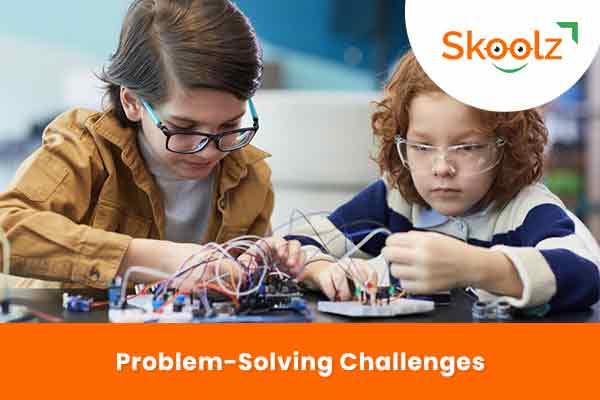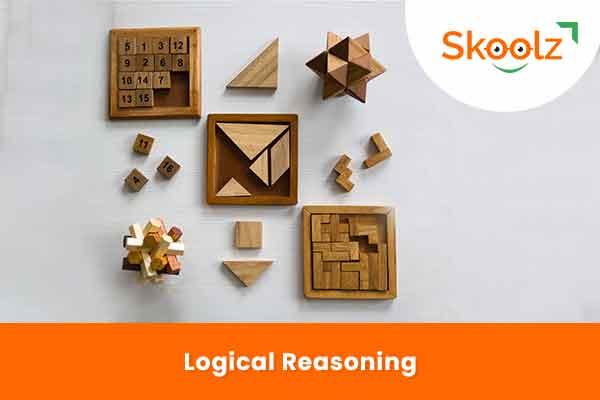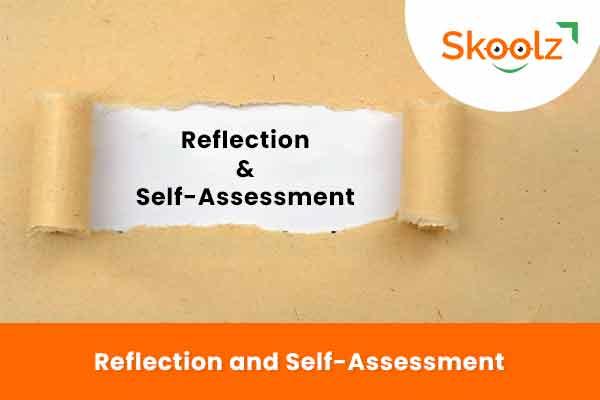
Developing Critical Thinking Skills in Middle School Students
Developing Critical Thinking Skills in Middle School Students
Critical thinking skills are essential for academic success and personal growth, and middle school is a crucial stage for their development. At Skoolz.in, we recognize the importance of equipping students with these skills. In this blog, we will explore effective strategies and approaches to foster critical thinking in middle school students, empowering them to become independent thinkers and problem solvers.
Encouraging Questioning

Open Discussions: Encourage students to ask questions and engage in open discussions about various topics, fostering curiosity and a habit of inquiry.
Socratic Seminars: Implement Socratic seminars or structured dialogues where students explore complex questions, analyze texts, and present well-reasoned arguments.
Problem-Solving Challenges

Real-World Scenarios: Introduce real-life scenarios and challenges that require critical thinking and decision-making.
Cross-Curricular Projects: Encourage cross-curricular projects that involve research, analysis, and problem-solving across multiple subjects.
Analytical Reading and Writing

Literary Analysis: Teach students to analyze literature by examining characters, themes, and the author's purpose, promoting critical thinking through literary discussions.
Persuasive Writing: Assign persuasive writing tasks, where students must present well-structured arguments supported by evidence.
Logical Reasoning

Puzzles and Brain Teasers: Integrate puzzles and brain teasers that challenge students' logical thinking and problem-solving abilities.
Logic Games: Utilize logic games and activities that engage students in deductive and inductive reasoning.
Data Analysis

Graph Interpretation: Teach students to interpret graphs and charts, fostering data-driven decision-making.
Scientific Method: Emphasize the scientific method, encouraging students to form hypotheses, design experiments, and draw conclusions based on evidence.
Ethical Dilemmas

Moral and Ethical Discussions: Explore moral and ethical dilemmas, promoting critical thinking about values and ethical decision-making.
Debate and Perspective Sharing: Organize debates and discussions that require students to consider multiple perspectives on a given issue.
Technology and Media Literacy

Media Analysis: Teach students to critically evaluate media messages, discerning fact from opinion and identifying bias.
Online Research: Guide students in conducting online research effectively, evaluating the reliability of sources.
Reflection and Self-Assessment

Metacognition: Encourage metacognition by prompting students to reflect on their thinking processes, recognize areas for improvement.
Peer Feedback: Incorporate peer assessment and feedback, allowing students to analyze each other's work and provide constructive criticism.
Conclusion
Developing critical thinking skills in middle school students is vital for their academic and personal growth. Skoolz.in is committed to helping parents and educators in this journey, providing resources and support to empower students as independent thinkers and effective problem solvers. By encouraging questioning, problem-solving, analytical reading and writing, logical reasoning, ethical reflection, and media literacy, middle school students can develop the critical thinking skills necessary for lifelong success.
Disclaimer:
The information provided in this blog is for general informational purposes only. While Skoolz.in recognizes the importance of developing critical thinking skills in middle school students and presents strategies for doing so, the content presented here is meant to be informative and does not constitute specific educational advice or endorsements of any particular approach. Strategies for fostering critical thinking skills may vary based on individual circumstances and educational settings. We recommend consulting with educators and educational professionals to tailor these principles to the specific needs and developmental stages of middle school students.
Frequently Asked Questions (FAQs):
Q1: What is the best way to encourage students to ask questions and engage in open discussions about various topics?
A1: Encouraging open dialogue and questions can be achieved by creating a safe and supportive classroom environment where students feel comfortable expressing their thoughts and curiosities.
Q2: Are there any specific strategies for implementing Socratic seminars or structured dialogues in the classroom?
A2: Socratic seminars involve students discussing a specific text or topic while adhering to guidelines that encourage active listening and thoughtful responses. Teachers can find numerous resources and guidelines for conducting effective Socratic seminars.
Q3: How can parents support their middle school children in developing critical thinking skills at home?
A3: Parents can foster critical thinking by engaging in thoughtful conversations, encouraging reading and discussing literature, solving puzzles together, and supporting their child's inquiries and curiosity.
Q4: What are some effective ways to introduce real-life scenarios and challenges for students to solve?
A4: Teachers can use case studies, hands-on projects, and real-world issues to present challenges that require critical thinking and problem-solving.
Q5: How can students develop logical reasoning skills through puzzles and brain teasers?
A5: Providing a variety of puzzles and brain teasers at different difficulty levels helps students develop logical reasoning. Teachers can introduce logic games that promote critical thinking.
Q6: What is the role of technology and media literacy in developing critical thinking skills in students?
A6: Technology and media literacy help students critically evaluate information sources, discern credible information from unreliable sources, and analyze media messages for bias and objectivity.
Q7: How can teachers incorporate reflection and self-assessment to enhance critical thinking in the classroom?
A7: Teachers can encourage metacognition by prompting students to reflect on their thinking processes. Peer assessment and feedback provide students with opportunities to critically evaluate and improve their work.
We hope that these FAQs provide additional clarity on developing critical thinking skills in middle school students and assist parents and educators in implementing effective strategies. If you have more questions or need further guidance, please feel free to reach out to Skoolz.in for additional support and information.

Swati Sahu
Digital Marketer

Developing Critical Thinking Skills in Middle School Students
Critical thinking skills are essential for academic success and personal growth, and middle school is a crucial stage for their development. At Skoolz.in, we recognize the importance of equipping students with these skills. In this blog, we will explore effective strategies and approaches to foster critical thinking in middle school students, empowering them to become independent thinkers and problem solvers.
Encouraging Questioning

Open Discussions: Encourage students to ask questions and engage in open discussions about various topics, fostering curiosity and a habit of inquiry.
Socratic Seminars: Implement Socratic seminars or structured dialogues where students explore complex questions, analyze texts, and present well-reasoned arguments.
Problem-Solving Challenges

Real-World Scenarios: Introduce real-life scenarios and challenges that require critical thinking and decision-making.
Cross-Curricular Projects: Encourage cross-curricular projects that involve research, analysis, and problem-solving across multiple subjects.
Analytical Reading and Writing

Literary Analysis: Teach students to analyze literature by examining characters, themes, and the author's purpose, promoting critical thinking through literary discussions.
Persuasive Writing: Assign persuasive writing tasks, where students must present well-structured arguments supported by evidence.
Logical Reasoning

Puzzles and Brain Teasers: Integrate puzzles and brain teasers that challenge students' logical thinking and problem-solving abilities.
Logic Games: Utilize logic games and activities that engage students in deductive and inductive reasoning.
Data Analysis

Graph Interpretation: Teach students to interpret graphs and charts, fostering data-driven decision-making.
Scientific Method: Emphasize the scientific method, encouraging students to form hypotheses, design experiments, and draw conclusions based on evidence.
Ethical Dilemmas

Moral and Ethical Discussions: Explore moral and ethical dilemmas, promoting critical thinking about values and ethical decision-making.
Debate and Perspective Sharing: Organize debates and discussions that require students to consider multiple perspectives on a given issue.
Technology and Media Literacy

Media Analysis: Teach students to critically evaluate media messages, discerning fact from opinion and identifying bias.
Online Research: Guide students in conducting online research effectively, evaluating the reliability of sources.
Reflection and Self-Assessment

Metacognition: Encourage metacognition by prompting students to reflect on their thinking processes, recognize areas for improvement.
Peer Feedback: Incorporate peer assessment and feedback, allowing students to analyze each other's work and provide constructive criticism.
Conclusion
Developing critical thinking skills in middle school students is vital for their academic and personal growth. Skoolz.in is committed to helping parents and educators in this journey, providing resources and support to empower students as independent thinkers and effective problem solvers. By encouraging questioning, problem-solving, analytical reading and writing, logical reasoning, ethical reflection, and media literacy, middle school students can develop the critical thinking skills necessary for lifelong success.
Disclaimer:
The information provided in this blog is for general informational purposes only. While Skoolz.in recognizes the importance of developing critical thinking skills in middle school students and presents strategies for doing so, the content presented here is meant to be informative and does not constitute specific educational advice or endorsements of any particular approach. Strategies for fostering critical thinking skills may vary based on individual circumstances and educational settings. We recommend consulting with educators and educational professionals to tailor these principles to the specific needs and developmental stages of middle school students.
Frequently Asked Questions (FAQs):
Q1: What is the best way to encourage students to ask questions and engage in open discussions about various topics?
A1: Encouraging open dialogue and questions can be achieved by creating a safe and supportive classroom environment where students feel comfortable expressing their thoughts and curiosities.
Q2: Are there any specific strategies for implementing Socratic seminars or structured dialogues in the classroom?
A2: Socratic seminars involve students discussing a specific text or topic while adhering to guidelines that encourage active listening and thoughtful responses. Teachers can find numerous resources and guidelines for conducting effective Socratic seminars.
Q3: How can parents support their middle school children in developing critical thinking skills at home?
A3: Parents can foster critical thinking by engaging in thoughtful conversations, encouraging reading and discussing literature, solving puzzles together, and supporting their child's inquiries and curiosity.
Q4: What are some effective ways to introduce real-life scenarios and challenges for students to solve?
A4: Teachers can use case studies, hands-on projects, and real-world issues to present challenges that require critical thinking and problem-solving.
Q5: How can students develop logical reasoning skills through puzzles and brain teasers?
A5: Providing a variety of puzzles and brain teasers at different difficulty levels helps students develop logical reasoning. Teachers can introduce logic games that promote critical thinking.
Q6: What is the role of technology and media literacy in developing critical thinking skills in students?
A6: Technology and media literacy help students critically evaluate information sources, discern credible information from unreliable sources, and analyze media messages for bias and objectivity.
Q7: How can teachers incorporate reflection and self-assessment to enhance critical thinking in the classroom?
A7: Teachers can encourage metacognition by prompting students to reflect on their thinking processes. Peer assessment and feedback provide students with opportunities to critically evaluate and improve their work.
We hope that these FAQs provide additional clarity on developing critical thinking skills in middle school students and assist parents and educators in implementing effective strategies. If you have more questions or need further guidance, please feel free to reach out to Skoolz.in for additional support and information.

Swati Sahu
Digital Marketer




